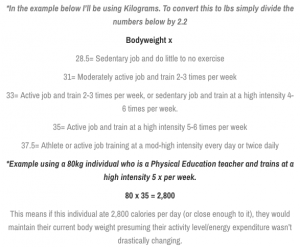The Real Reason Why You Can’t Lose Weight
You feel like you’ve tried every diet under the sun but you still can’t lose weight. Don’t worry; you’re not the only one.
There’s a good reason why you haven’t lost weight…
It’s not the type of food you’re eating (e.g. carbs or fats)
It’s not the amount of sugar you’re eating
It’s not because you like to have a wine with dinner a few nights per week
It’s not because you didn’t have your protein shake within 30 minutes of finishing you gym session
It’s not because you only have 3 meals a day instead of 6
It’s not because you have a slow metabolism
It’s not genetics
It’s not because dieting doesn’t work for you (what does this even mean?!)
The real reason is that you’re eating too much. Almost sounds a little too simple right? That’s because it is, and chances are you already knew this but society and clever marketing leads you to believe otherwise.
The biggest problem in the Health and Fitness industry in this day and age is that there is such a large focus on ‘money making’ diets. Fads, detoxes, cleanses, pyramid schemes. These all have one thing in common, they aren’t sustainable. The give you short term drastic results that often lead to more bad than good. For example: binge eating, negative relationship with certain foods or food groups, a misconception as to what it takes to actually lose weight in a healthy manner that isn’t going to cause you too lose muscle mass plus not to mention the hole these diets are burning in your pocket.
To lose weight you must follow one simple rule, burn more calories than you take in. That’s it. No foods are off limits, just eat within your calorie goal.
To make sure you’re losing weight in the correct manner there’s a few easy to follow steps you can take.
-Eat enough protein. I recommend 2-2.5g per kilogram of bodyweight.
-Eat 1 serving of fruit and 2 servings of vegetables for every 1,000 calories consumed.
-Eat no more than 500 calories below your maintenance. (You might be thinking “How the hell do I find out my maintenance calories?” see the picture below or check out this article)

Important: Although this formula and other online calculators are great for giving you a starting point for what your maintenance calories should be, the most accurate way to find your maintenance is to track your NORMAL food intake over the span of 1-2 weeks. If your body weight stays the same or very close to it then simply get an average daily calorie number from those 1-2 weeks that you tracked your food and you now have your exact maintenance calorie intake.
-Only reduce calories if your weight loss stalls for more than 2-3 weeks.
-Drink more water than you currently are
-Complete at least 2 strength-training sessions per week.
-Start with minimal cardio and only add in more when necessary. For example you might start out with 1 x 30 minutes of cardio per week. When weight loss stalls you can either:
1. Reduce calories slightly
2. Add more cardio
3. Do a little bit of both.
Things to keep in mind:
-Slow and steady wins the race. I recommend no more than 500g of fat loss per week, although in the initial stages it will likely be more.
-The amount of meals you eat per day has no relevance, as long as you reach your calorie goal.
-Eating well 5 days per week isn’t enough. Consistency is the key, eat within your calorie goal every day and you WILL see progress.
So that’s it, it’s nowhere near as hard as it may seem. Follow these simple rules and I can guarantee you’ll see progress in your weight loss journey.
I would love for you to share this with family and friends on social media or leave a comment below letting me know what you think about this blog post.

